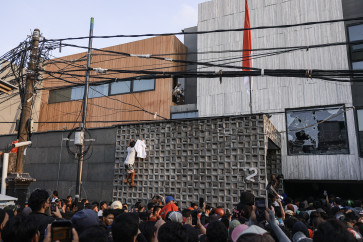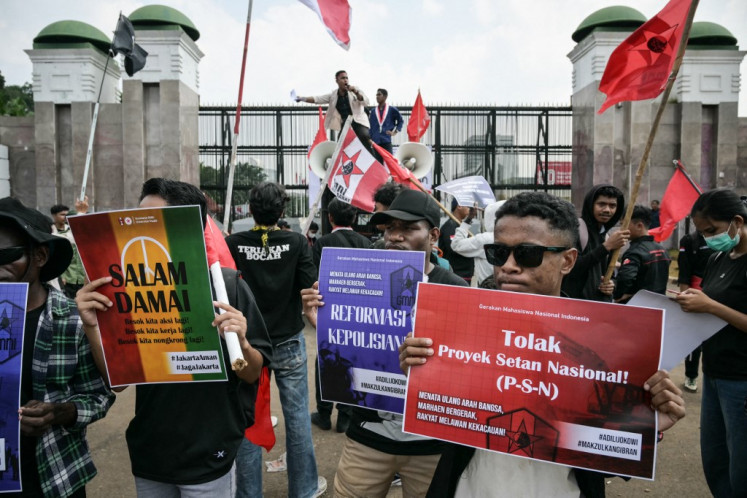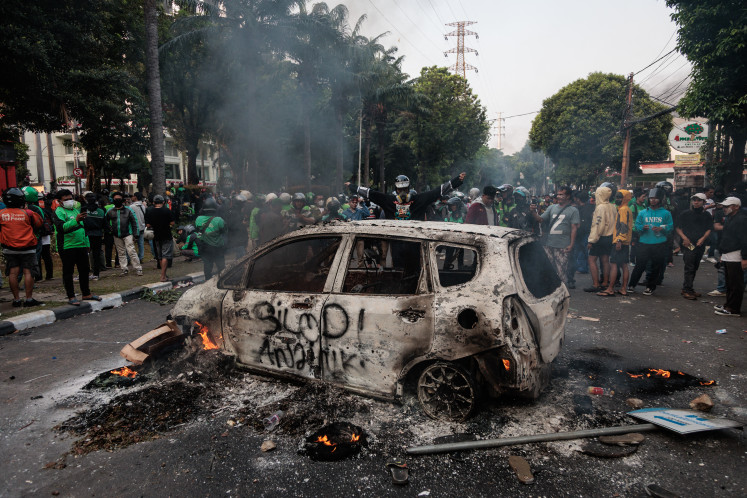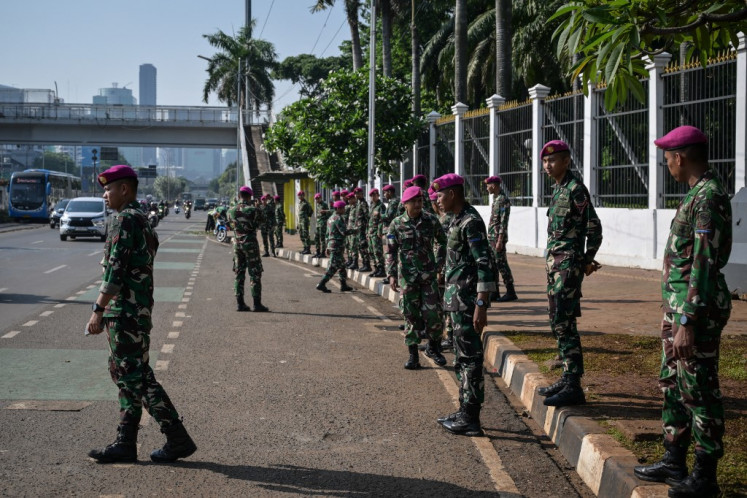Popular Reads
Top Results
Can't find what you're looking for?
View all search resultsPopular Reads
Top Results
Can't find what you're looking for?
View all search resultsMore think tanks, more policy inputs
With Indonesia’s growing role in the global arena, the country needs a healthy foreign policy community to provide the government with inputs to tackle challenges
Change text size
Gift Premium Articles
to Anyone
W
ith Indonesia’s growing role in the global arena, the country needs a healthy foreign policy community to provide the government with inputs to tackle challenges. The Jakarta Post presents reports on the role of foreign community players in influencing foreign policy, especially after the fall of Soeharto.
The fall of Soeharto in 1998, which was followed by reform in almost every aspect of Indonesian life, has also brought democratization to the country’s foreign policy, with more players emerging within the foreign policy community in the aftermath of the reform.
While the Centre for Strategic and International Studies (CSIS) continues to this day to be the leading think tank, its current role in influencing foreign policy cannot be compared to during the Soeharto era, with one of CSIS founders Jusuf Wanandi saying it would “only take one night for the think tank’s proposal to be executed by the New Order cabinets”.
The Indonesian Institute of Science (LIPI), with its two most notable figures — Dewi Fortuna Anwar and Ikrar Nusa Bhakti — and research centers at universities, especially the University of Indonesia in Jakarta and Gadjah Mada University in Yogyakarta, have since then begun to grab the limelight.
Especially under the presidency of B.J. Habibie, the role of Islamic scholars in CIDES, now the Habibie Center, became prominent.
The Foreign Ministry and the presidents after Soeharto had more options, with former foreign minister Hassan Wirajuda acknowledging that there was a decline of a particular think tank’s participation in policy making, as competition among information sources heightened.
“Actually, it is an open space. In fact, as part of civil society, think tanks should thrive more these days than in the old days, under the authoritarian government. Perhaps, in the past, one think tank had an information monopoly.
In this open society, information is in the market. Readers have easy access now. You may have think tanks, but if they don’t contribute to a debate, people will not appreciate it.”
That is why strong think tanks are needed, in terms of strong management, financial support and also a group of researchers that produce opinions and articles that are widely read.
“We have to be more creative, because otherwise our competition will not only be our fellow domestic institutions, but also those abroad.”
In addition, Hassan underlined the credibility of the institution and the people behind it. This is the
consequence of the age of information while there is a free flow of information.
“This means credibility. These days, people will not read or look at your institution if your credibility is in doubt. Think tanks should be credible in order to exist.”
A veteran diplomat, Hashim Djalal said that the current think tanks produced an “inadequate number” of studies on foreign affairs that the government could use as a basis for its foreign policies.
“As far as I know, they don’t formulate the results of academic discussions into concrete recommendations for the government,” he said.
As a former ambassador to the United States, Soemadi Brotodiningrat said he found think tanks’ inputs, especially the CSIS’ studies, useful when it came to data and analysis.
“From what I learned, we did not take recommendations, for instance from the CSIS, for granted. But
we took them into consideration,” he said.
Hassan, however, said that in a more open and democratic Indonesia, policy makers should be more open in accepting input from different elements in the society, so that the policy could reflect the aspirations of the public.
During his terms as foreign minister, Hassan conducted different kinds of forums attended by a variety of groups in society, including the Foreign Policy Breakfast, in which think tanks, academia, politicians, religious leaders, civil society, and individuals were invited to the Foreign Ministry to discuss current events.
For Hassan, it was an effective mechanism. This was an opportunity to explain basic foreign policy orientation to the public in general.
“We benefited a lot because at the same time, Pejambon [the Foreign Ministry] could seek input from them,” Hassan added.
Hariyadi Wirawan of the University of Indonesia’s School of International Relations, said that cooperation between universities and the government had increased.
“We have formal and informal cooperation with the Foreign Ministry and the Defense Ministry. Our scholars have been used by both of the ministries as advisors or researchers,” he said.
Hariyadi said that the growing role of universities complemented them, rather than created competition.
“This is a very healthy condition for Indonesia, and academics can help provide useful input as the government can’t know everything,” he said.
Hassan agreed, saying that the ministry simply could not pretend that it knew everything.
“Think tanks and universities tend to have their own specializations: in economics, political issues, or in regions like the Middle East, or Asia Pacific, etc.
“We learn from their expertise, and it enriches us. It is useful in the process of both policy formulating and implementation,” he said.
Thinktank
Name: Centre for Strategic and International Studies (CSIS)
Scope:
CSIS undertakes research in economics, politics and social change, and
inter national relations, with topics selected on the basis of their
relevance to public policy.
Name: Center for Information and Development Studies (CIDES)
Scope:
Assessing and supporting the development cooperation between developing
countries to strengthen national self-reliance and collective
self-reliance.
Name: The Center for Political Studies (P2P) of Indonesian Institute of Sciences (LIPI)
Scope:
To develop social sciences, especially the encroachment of concepts and
new theories of political science, comparative politics, area studies,
and international relations that have the ability to explain the various
sociopolitical phenomena, whether at domestic, regional or global
levels.
Name: Institute of Defense and Security Studies (IODAS)
Scope: Studies, researches, discussions, networking recommendations and publications with the expectation to contribute ideas
Name: The Habibie Center
Scope: To promote modernization and democratization in Indonesia
Universities
Name: Center for East Asian Cooperation Studies (CEACoS)
Founder: Department of International Relations, University of Indonesia
Scope:
Promoting research on East Asia, Cooperation in the economic,
political, security, and cultural relations with a view to enhancing
cooperation among countries in East Asia.
Name: Parahyangan Centre for International Studies (PACIS)
Founder: Department of International Relations, Parahyangan Catholic University, Bandung.
Scope:
To comanage the lives of the world through the development and
application of International Relations from a Third World perspective
and assist the various parties in global life.
Name: Institute of International Studies (IIS)
Founder: Department of International Relations, Gadjah Mada University, Yogyakarta
Scope: A research institution focusing on the study of International Relations.
Media
Name: The Jakarta Post
Established: April 1983
Figures:
Sabam Siagian (Former editor-in-chief and Former Indonesian ambassador
to Australia) Susanto Pudjomartono (Former editor-in-chief and Former
Indonesian ambassador to Russia) Endy M. Bayuni (former editor-in-chief
of The Jakarta Post and currently a visiting fellow at the East-West
Center in Washington)
Name: Kompas
Established: Juni 1965
Figures: Rikard Bagun (Editor-in-chief of Kompas) Trias Kuncahyono ( Deputy-in-chief of Kompas)
Source: The Jakarta Post










